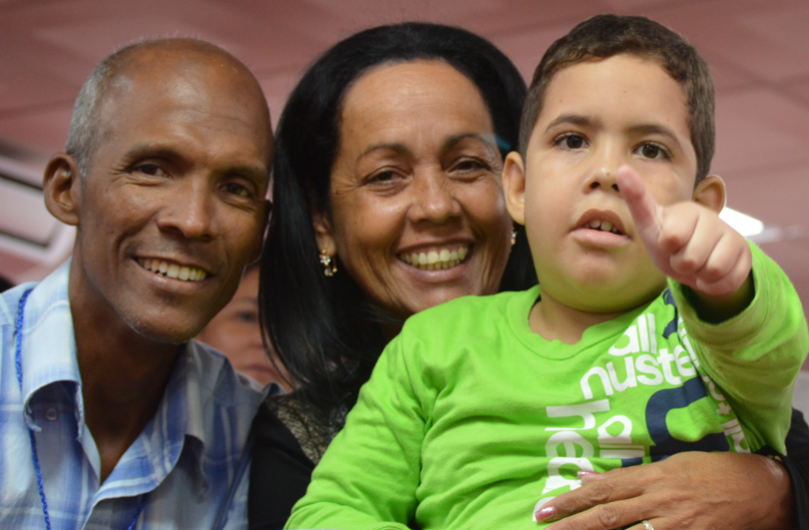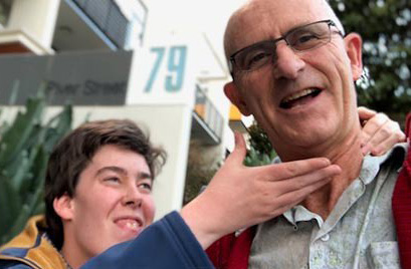Prader-Willi syndrome and Duty of Care
When you have a son or daughter with Prader-Willi syndrome (PWS) who continues to live in the family home, your parental duties do not reduce as your person with PWS progresses through the different stages of life. This can be very tiring and impact on you and your whole family. Caring for an adult with PWS means you rarely have time to relax and feel that all is well. People with disabilities are as much a part of society as anyone else and you, as parents or family members, have the right to expect and advocate for their needs to be met. This means seeking the best possible workplace, respite care or day support for your family member. A major difficulty with most service providers is their keenness to promote independence for individuals will often include options that are inappropriate for people with PWS, despite the fact that the person with PWS may try to convince those supporting him/her, otherwise.
Does your adult with PWS attend a day service or work program? Does the day service or work program provide adequate supervision around food, to assist with their weight management and anxiety around food? Does the day service provide an opportunity for your person with PWS to be active and involved in sensory motive activities during the day? Do they support your son’s or daughter’s need for assistance with activities of daily living, monitoring or helping them in the bathroom? Do they facilitate successful social encounters and intervene effectively with conflict? Have you ever been told that your person with PWS is not able to attend a day service, respite service or work program due to difficult behaviour?
Duty of care in this article refers to duty of care of Parents (it never stops!) and Duty of Care of those who are responsible for your son or daughter with PWS when they are away from the family home. Duty of Care means taking on the responsibility of acting in the best interest of the person with PWS. This can only be done by respecting the person with PWS as an individual and knowing and understanding the intricacies of the syndrome. To keep a person with PWS safe and healthy, independence and autonomy need to be nurtured within the use of necessary restrictive practices. This can usually be achieved by providing appropriate choice, consistent rules and companionship to the person with PWS. Allowing time to prepare a person for a new situation, to sit quietly and talk with them about what may be troubling them, and to encourage respectful friendliness and humour when firmness is required, are strategies that can assist with management of highly anxious people such as those with PWS. Acquired agreements rather than authoritative demands are the key to success when working with people with PWS.
A parent writes:
For me, this has been a crazy time. The best advice I can give any parent caring for an adult with PWS is to seek information about your legal system and the ability for you, as a parent or family member, to legally make decisions for the health and well being of your adult person with PWS. This status ensures your consent MUST be given about any change in their welfare or “property”, including money. It also allows you to instruct people caring for your son or daughter, whether in the work environment, day program or care environment about management strategies (like, locking up the food, or the fact that the person with PWS must be accompanied by another adult). Your son or daughter will not be able to take or use any money without your permission. These instructions can be are final and lawful in most countries. If you do not have such a process where you live, then a letter from your doctor stating that your adult child has a genetic disorder that causes them to seek food, may be necessary.
While gaining legal authority to make decisions may be necessary in some instances, you should be mindful of the risk of ‘chronic disempowerment’, the circumstance that arises when a legal guardian removes the individual’s ability to exercise choice and control over their lives. All decisions made on their behalf should therefore be based around the principal of ‘least restrictive practice’.
Most people either do not know about PWS or do not really understand why a person with PWS seeks food, becomes anxious or displays difficult behaviour associated with food or change. Many people with PWS will try to convince you that they are capable of managing their own lives. They may insist verbally or physically, that they can socialise independently, spend their money on what they choose and do whatever they want. This can create a difficult situation for service providers. As parents or family members who are responsible for someone with PWS it is your right and responsibility to inform others of your son’s or daughter’s needs. It is important to help others understand about PWS through the use of evidence based information. Do not be intimidated or embarrassed by people saying “it will be OK”, “Don’t worry!” This means they are not listening to you or taking your concerns seriously. Do not let people make you feel as though you are interfering with their work. You are alerting them to the needs of your son or daughter with PWS.
If is planned that your son or daughter is going to spend time in the care of someone else, it is advisable for all to meet to discuss what is expected of the person with PWS, what are the caregivers’ responsibilities and what will happen if things go wrong. It is essential to have a backup plan, which initially, may require a parent to be available to pick up their son or daughter should a difficult situation arise. Hopefully, with experience and knowledge, parents will eventually be able to rely on service providers to work positively with him or her through the use of appropriate management strategies. You may need to meet regularly with service providers because everything you do at this stage of your family member’s life needs to be carefully planned. Giving service providers a set of instructions that they can work from will be very helpful for them. Give them information about PWS, how people with PWS think and how they respond or react to different situations and approaches. Make sure you provide resources such as: IPWSO’s “Medical Alerts” booklet, backup plans and emergency contact numbers to any individual or service provider working with your son or daughter.
This article is to help you source or establish the appropriate support for your person with PWS, by providing people working with your family member with PWS, information based on research and experience to support your requests.
PWS is a genetic disorder with which a child is born. It does not occur due to something the child’s mother or father has, or has not, done. The behaviour of someone with PWS does not result because of poor parenting skills. People with PWS have an intellectual disability and an altered way of thinking. They are emotional, often anxious and reactive and can exhibit difficult, disruptive and embarrassing behaviour. They are preoccupied with food and cannot stop eating when food is available. These characteristics have been related to missing genetic material. People with PWS react negatively to criticism and belittling, but react positively to compliments and respect. People with PWS must have a limited intake of food and beverages if they are to live a healthy life. Every calorie/kilojoule counts, especially when they only need 60-80% of the energy required by most people.
To help people with PWS achieve their potential the severity of their PWS characteristics must be acknowledged. How the characteristics of PWS impact on the person’s ability and needs, determines the level of support they require. Those who work with them in any capacity have a Duty of Care to respect and manage them according to their ability and limitations.
Most people with PWS try to do their best to please family, friends and others in their life, but it is often difficult for them. Crisis situations occur when expectations are set too high and the support provided is not sufficient to meet their needs or sensitive issues are not recognised and addressed – such as how the anxiety caused by visible or accessible food in the workplace.
People with PWS think differently!
They need to be spoken to gently, but with confidence, using fewer simple words and directions. They respond poorly to yelling, fast speech or long conversations and directions. Requesting their assistance and giving them “responsibility” will appeal to their desire to please, and help develop self confidence.
Remember, people with PWS are concrete thinkers. Promises or suggestions that can be perceived as promises, must be doable and realistic with no room for “underlying messages” or insinuation. People with PWS are anxious and sensitive and can easily misunderstand or misconstrue complicated conversation. People working with them need to mean everything they say! Humour and joking must be kept in simple terms until they are well known to those working with them.
Explain to others that people with PWS get stuck when trying to complete multi-stepped tasks. This is why they appear to be slow or stubborn, when asked to hurry to complete and activity/action. Ask for multi-stepped tasks to be explained in simple, individual stages or with picture stories.
Helping others understand what PWS is all about will assist them to work appropriately with your person with PWS, who will then eventually respond well and become more accepted by their community. “The road to success is always under construction”.
A parent writes:
Quite often caregivers or supervisors are not good at giving our son or daughter “instructions”. They may be younger than our son or daughter and feel uneasy about exerting their influence. They may also be trying to encourage our son or daughter to be “independent”! Typical independence is not helpful for someone with PWS. It is our responsibility, as parents or responsible family members to provide information for them to make them feel as confident as they can be in supporting our son or daughter in all circumstances. If they are not the right people to do this, then look for others who would be. If a suitable workplace or day programme does not exist, then approach the current supervisors and ask if they would be willing to learn what is needed for people with PWS. You may find support from other parents in the same situation.
Lifetime Duty of Care is a right of all people with PWS!
If a service provider or employer is willing to work with someone with PWS, then they must accept the responsibility of providing an appropriate environment for them. They can only do this by being informed and educated about PWS. The information you give people working with your son or daughter with PWS needs to be accurate and is best if it is based on science and lifetime experience.
This article was written by IPWSO’s Famcare Board.
International Community
IPWSO was established so that PWS associations, families, clinicians and caregivers around the world could exchange information and support and have a united global voice under one umbrella.
Information for Medical Professionals
The latest medical and scientific research and information, plus guides into common medical issues affecting people with PWS.



